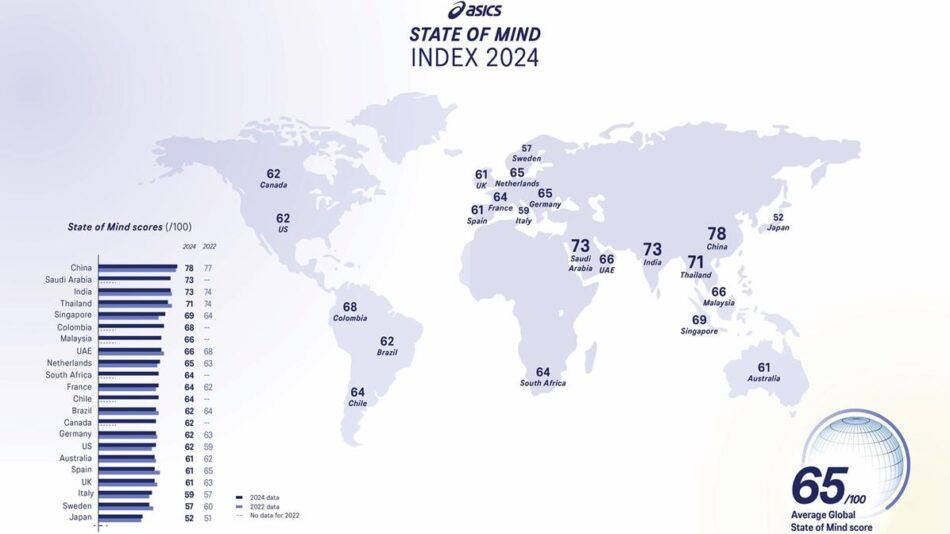ASICS global study shows link between regular exercise in teenage years and positive mental wellbeing in adulthood

- Global ASICS study of 26,000 people reaffirms the connection between movement and the mind and uncovers a direct link between teenage physical activity and adult mental wellbeing.
- Each additional year a teenager remains engaged in exercise is associated with improved State of Mind scores in adulthood, with the ages of 15-17 identified as the most critical years for staying active.
- Yet, younger generations are disengaging from exercise earlier and in larger numbers, potentially impacting their mental wellbeing now and for years to come.
9 April 2024 – Today, ASICS is announcing the results of its second Global State of Mind Study, which reaffirms a positive link between physical exercise and mental wellbeing and uncovers a link between being physically active in teenage years and positive mental wellbeing in adulthood.
The study of over 26,000 respondents across 22 countries found that the more people exercise, the higher their State of Mind scores1. Across the globe, respondents who are regularly active2 have an average State of Mind score of 67/100, while inactive3 people have a much lower State of Mind score of just 54/100.
What’s more, the study uncovered that being physically active in your teenage years directly impacts your mind later in life. Participants who engaged in exercise throughout their adolescence report higher activity levels and State of Mind scores as adults. The findings indicate that remaining active as a teenager is key to establishing good exercise habits that last into adulthood and positively impact adult mental wellbeing.
In fact, the study was able to pinpoint the ages of 15-17 as the most critical years for staying active and when dropping out of exercise significantly affects your mental state for years to come. Those who regularly exercised at 15-17 years old are found to be more likely to remain active later in life and report higher State of Mind scores as adults (64/100 vs 61/100) than those who weren’t active during these years.
In comparison, respondents who dropped out of exercise before the age of 15 displayed the lowest activity levels and lowest State of Mind scores in adulthood. 30% are still inactive as adults and they are shown to be 11% less focused, 10% less confident, 10% less calm and 10% less composed compared to those who were able to exercise throughout adolescence.
In fact, every year a teenager remained engaged in regular exercise is associated with improved State of Mind scores in adulthood. Those who stopped exercising before the age of 15 display an average State of Mind score 15% lower than the global average, while a decline in physical activity at 16-17 and before the age of 22 reduced their average scores by 13% and 6% respectively.
Worryingly, the study also uncovered an exercise generation gap, with younger generations being increasingly less active. 57% of the Silent Generation (aged 78+) said they were active daily in their childhoods compared to just 19% of Gen Z (aged 18-27), showing a concerning trend of younger generations dropping out of physical activity earlier and in larger numbers than the generations before them.
Globally, members of Gen Z have the lowest State of Mind scores with an average of 62/100 compared to the Baby Boomers’ 68/100 and the Silent Generation’s 70/100.
Professor Brendon Stubbs, a leading researcher in exercise and mental health from King’s College London, said: “It is worrying to see this decline in activity levels from younger respondents at such a critical age, particularly as the study uncovered an association with lower wellbeing in adulthood”.
Gen Zs across the world are already exhibiting the lowest State of Mind scores (62/100) in comparison to the Silent Generation (70/100), so this could be hugely impactful for future mental wellbeing across the world.”
Tomoko Koda, Managing Executive Officer for ASICS said: “ASICS was founded on the belief that sport and exercise benefit not only the body, but also the mind. It’s why we’re called ASICS: ‘Anima Sana in Corpore Sano’ or ‘Sound Mind in a Sound Body’. The results of our second global State of Mind Study show how important it is that young people stay active and the impact this can have on their minds for years to come. At ASICS, we’re committed to supporting and inspiring people to move for positive mental wellbeing throughout their lifetime.”
To find out more visit: http://www.asics.com/mk/stateofmindstudy2024
1The ASICS State of Mind score is out of 100, calculated based on the accumulative mean scores across ten cognitive and emotional traits – positive, content, relaxed, focused, composed, resilient, confident, alert, calm, energized.
2150 minutes or more of physical activity per week (as defined by Sport England)
3Less than 30 minutes of physical activity per week (as defined by Sport England)
– ENDS –
About the ASICS 2024 State of Mind Study
The 2024 State of Mind Study was conducted between 17 November – 21 December 2023 and explored the relationship between exercise and State of Mind across the world.
Over 26,000 people were surveyed across 22 markets including Australia, Brazil, Canada, Chile, China, Colombia, France, Germany, India, Italy, Japan, Malaysia, Netherlands, Saudi Arabia, Singapore, South Africa, Spain, Sweden, Thailand, UAE, the UK and the US. Each market sample was nationally representative by age and gender.





